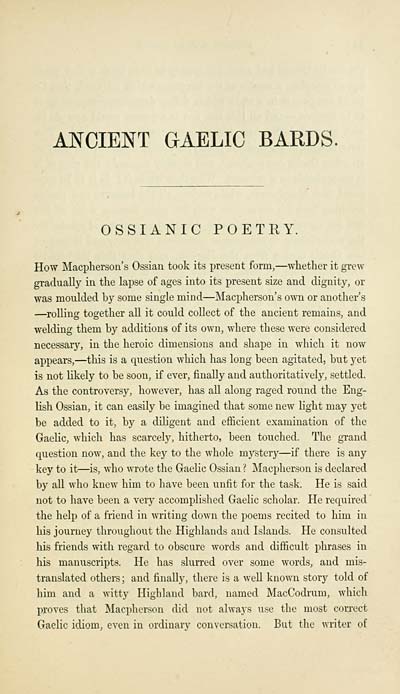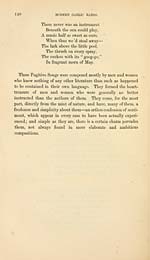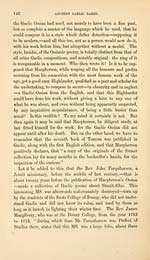Download files
Complete book:
Individual page:
Thumbnail gallery: Grid view | List view

ANCIENT GAELIC BARDS.
OSSIANIC POETRY.
How Macj)lierson's Ossian took its present form, — whether it grew
gradually in the lapse of ages into its present size and dignity, or
was moulded by some single mind — Macpherson's own or another's
— rolling together aU it could collect of the ancient remains, and
welding them by additions of its own, where these were considered
necessary, in the heroic dimensions and shape in which it now
appears, — this is a question which has long been agitated, but yet
is not likely to be soon, if ever, finally and authoritatively, settled.
As the controversy, however, has all along raged round the Eng-
lish Ossian, it can easily be imagined that some new light may yet
be added to it, by a diligent and efficient examination of the
Gaelic, which has scarcely, hitherto, been touched. The grand
question now, and the key to the whole mystery — if there is any
key to it — is, who wrote the Gaelic Ossian ? Macpherson is declared
by all who knew him to have been unfit for the task. He is said
not to have been a very accomplished Gaelic scholar. He required
the help of a friend in writing down the poems recited to him in
his journey throughout the Highlands and Islands. He consulted
his friends with regard to obscure words and difficult phrases in
his manuscripts. He has slurred over some words, and mis-
translated others ; and finally, there is a well known story told of
him and a witty Highland bard, named MacCodrum, which
proves that Macpherson did not always use the most correct
Gaelic idiom, even in ordinary conversation. But the writer of
OSSIANIC POETRY.
How Macj)lierson's Ossian took its present form, — whether it grew
gradually in the lapse of ages into its present size and dignity, or
was moulded by some single mind — Macpherson's own or another's
— rolling together aU it could collect of the ancient remains, and
welding them by additions of its own, where these were considered
necessary, in the heroic dimensions and shape in which it now
appears, — this is a question which has long been agitated, but yet
is not likely to be soon, if ever, finally and authoritatively, settled.
As the controversy, however, has all along raged round the Eng-
lish Ossian, it can easily be imagined that some new light may yet
be added to it, by a diligent and efficient examination of the
Gaelic, which has scarcely, hitherto, been touched. The grand
question now, and the key to the whole mystery — if there is any
key to it — is, who wrote the Gaelic Ossian ? Macpherson is declared
by all who knew him to have been unfit for the task. He is said
not to have been a very accomplished Gaelic scholar. He required
the help of a friend in writing down the poems recited to him in
his journey throughout the Highlands and Islands. He consulted
his friends with regard to obscure words and difficult phrases in
his manuscripts. He has slurred over some words, and mis-
translated others ; and finally, there is a well known story told of
him and a witty Highland bard, named MacCodrum, which
proves that Macpherson did not always use the most correct
Gaelic idiom, even in ordinary conversation. But the writer of
Set display mode to: Large image | Transcription
Images and transcriptions on this page, including medium image downloads, may be used under the Creative Commons Attribution 4.0 International Licence unless otherwise stated. ![]()
| Early Gaelic Book Collections > Ossian Collection > Selections from the Gaelic bards > (165) |
|---|
| Permanent URL | https://digital.nls.uk/78071831 |
|---|
| Description | Selected books from the Ossian Collection of 327 volumes, originally assembled by J. Norman Methven of Perth. Different editions and translations of James MacPherson's epic poem 'Ossian', some with a map of the 'Kingdom of Connor'. Also secondary material relating to Ossianic poetry and the Ossian controversy. |
|---|
| Description | Selected items from five 'Special and Named Printed Collections'. Includes books in Gaelic and other Celtic languages, works about the Gaels, their languages, literature, culture and history. |
|---|

